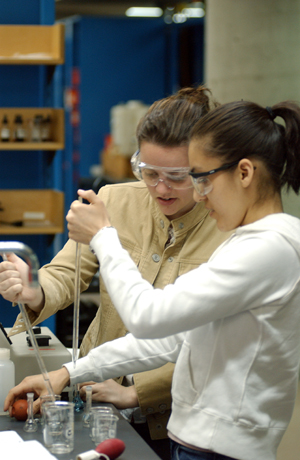Wellesley College Receives Howard Hughes Medical Institute Education Grant of $1.2 Million
| For
immediate release: April 22, 2008 |
Contact:
Arlie Corday, acorday@wellesley.edu |
 |
Wellesley's new education grant from the Howard Hughes Medical Institute will boost opportunities to engage students in the sciences. |
WELLESLEY, Mass. – Do cleaning products affect our health? Does mercury in rivers and streams harm the ecosystem? Can an invasive species deplete biodiversity, hurting the environment and human health?
Research into these questions – and many more – just received a boost at Wellesley College with a new $1.2 million grant from the Howard Hughes Medical Institute (HHMI). A year ago, HHMI issued a challenge to 224 undergraduate colleges nationwide: identify creative new ways to engage your students in the biological sciences. Now HHMI has named Wellesley one of 48 award recipients that will receive a total of $60 million to help usher in a new era of science education.
According to Barbara Beltz, Hallowell Farwell professor of neuroscience, and John Cameron, professor of biological sciences, the HHMI grant will benefit the entire Wellesley College science faculty and their students. It is the sixth HHMI grant to Wellesley, for a total of $6.4 million over the last 20 years.
“Historically, Hughes support has made an enormous difference for us,” Cameron said. “Wellesley has been phenomenally successful in terms of graduating students who go on to receive Ph.D.’s in the sciences, and I think an enormous part of that has been the research experience our students get. Hughes has been a major factor in that.”
The nationwide grant recipients, primarily undergraduate institutions, include traditional liberal arts colleges, historically black colleges and universities, small religious schools, and larger state institutions, all united by a commitment to teaching undergraduates.
“Liberal arts colleges— particularly some of our grantee institutions—have long been successful in educating future scientists,” said HHMI President Thomas R. Cech, himself a graduate of a liberal arts institution, Grinnell College in Iowa. With the award, Wellesley’sUndergraduate Science Education Program will build on past accomplishments and tackle lofty goals. The program aims to attract and retain women who will go on to advanced degrees and careers in the sciences, to encourage science education for all students and to expand interdisciplinary teaching and research. Among its highlights, the grant underwrites a new plan to hire students to work as postgraduate interns with professors still establishing themselves in their fields, a luxury most junior faculty members don’t enjoy.
"Having students as postgraduate interns is something new and different for us, and it will have an effect on the most people,” Beltz said. “We will be hiring graduating seniors who have been working in a lab to stay on for one more year. They will interface between the faculty member and undergraduates, a program that benefits current students, graduating students and faculty members.”
The HHMI grant will also strengthen a multitude of academic programs, benefitting hundreds of students over for next four years and providing:
• supplies and expenses for students who conduct research during the academic year and during intersession study;
• research stipends for students who work with individual faculty mentors;
• funds for students to accompany science faculty members to professional meetings to present research;
• funds for students who are conducting independent research projects to travel to other venues to gather data;
• support for both Wellesley College students and college students from Russia and Belize who participate in a summer research program;
• help for the Mentoring in Sciences program for students from underrepresented minorities;
• professional development workshops for all science faculty;
• help to promote the recruitment and hiring of underrepresented minority postdoctoral fellows and faculty by joining a consortium of liberal arts colleges;
• a curricular development fund allowing faculty to develop new courses or enhance existing ones;
• equipment acquisitions and more.
In addition, for the first time, Wellesley’s Outreach Program, which encourages youngsters’ interest in science education, will have a formal budget, thanks to the HHMI grant.
“The Outreach Program, led by [lab instructor] Janet McDonough, is really important,” Beltz said. “Wellesley promotes science in secondary and elementary schools—any kind of environment where we can raise the bar on the quality of science education, including inner-city schools.”
One of the world's largest philanthropies, HHMI is a nonprofit medical research organization that employs hundreds of leading biomedical scientists and is the nation's largest private supporter of science education. It has invested more than $1.2 billion in grants to reinvigorate life science education at both research universities and liberal arts colleges and to engage the nation's leading scientists in teaching. For more on the HHMI grants, go to http://pressroom.hhmi.org.
Since 1875, Wellesley College has been a leader in providing an excellent liberal arts education for women who will make a difference in the world. Its 500-acre campus near Boston is home to 2,300 undergraduate students from all 50 states and 68 countries.
###
